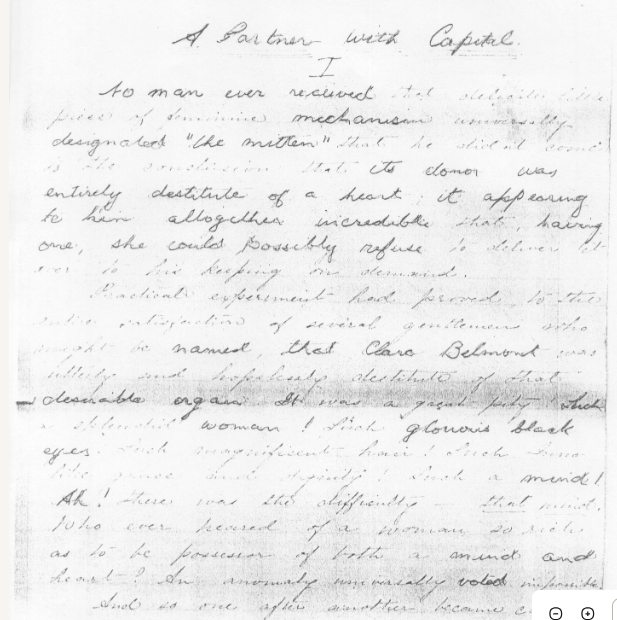“Whoever heard of a woman so rich as to be possessor of both a mind and heart?”
Lavinia Goodell, 1870s
The William Goodell family papers housed in the Special Collections and Archives of Berea College in Berea, Kentucky contain a draft of a short story written by Lavinia Goodell titled “A Partner With Capital.”

The story is undated, but following Lavinia’s signature at the end is the notation “Janesville, Wis,” which would mean it was written between late 1871 and late 1879. An educated guess would place it in the early 1870s, before Lavinia began her legal studies, since once she embarked on that path she had little time for other frivolous undertakings, and a 28-page short story could not have been dashed off in short order.
There is no record of this story being published, nor is there any indication that Lavinia ever submitted it for publication. This is not surprising because the piece reads like an early draft and lacks the polish of Lavinia’s finished pieces. Nonetheless, A Partner with Capital is noteworthy because it seems to give the reader a glimpse of Lavinia Goodell’s own views on women’s role in society, romance, and marriage.
The story largely consists of an exchange between two cousins: Minnie Lancing, a romantic soul who longs for a good match, and practical Clara Belmont, who doubts that love and marriage are in her future. Assuming the story has some autobiographical components, Clara is plainly the Lavinia Goodell doppelganger. Lavinia describes Clara as a splendid woman who possesses grace and dignity, but her key attribute was, “Such a mind! Ah! That was the difficulty – that mind! Whoever heard of a woman so rich as to be possessor of both a mind and a heart? An anomaly universally voted impossible.”
Clara says she has “refused many proffered hands, but never refused a heart because none was ever offered.” Instead, men either had just a passing fancy for her or they thought she would “set off their establishment handsomely.” Clara says, “My ideas of love and marriage are so exalted that I believe they’ll result in my being an old maid.” Lavinia Goodell expressed similar sentiments on multiple occasions.
The story then moves forward one year, during which time Clara’s father has died, leaving her responsible for the care of her two younger siblings. At first, Clara fears she will have to take a job as a teacher, “the great resort of impecunious womanhood.” This statement also mirrors one made by teenage Lavinia, who mused that she thought the practice of law would be interesting but she supposed she would have to teach because that was all a woman could do.
Clara is spared from becoming a teacher when she answers a newspaper advertisement for an assistant editor, “either on a salary or as a partner with capital.” Based on the recommendation of a former professor, she gets the job. Her employer is W.J. Richmond, editor and proprietor of the Christian Citizen newspaper. He is a “good sized, well-proportioned, middle aged man, with clear strait forward eyes, expressive of sincerity and kindliness.”
Clara quickly takes to her new duties. At first she is thrilled to be earning money, telling her cousin, “I never felt so rich and independent as when Mr. Richmond handed me my first fifty dollars. I am learning to pity poor girls who don’t earn their own money.” This comment, too, could have been lifted from Lavinia’s late 1860s letters when she had a good-paying job in Manhattan at Harper’s Bazar magazine. Clara soon begins to admire her employer for his intelligence, dignity, and high moral principles and she slowly realizes that she has at last found a life partner with capital. Yes, Mr. Richmond won her heart, and “in due time our heroine was installed mistress of a tasty little cottage home in a suburban village.”
Read the entire story here.
Although A Partner With Capital lacks the polish of most of Lavinia Goodell’s published pieces, it is certainly a worthy early draft, and it definitely echoes themes that reverberated throughout Lavinia’s life: An intelligent woman refuses to settle for a man who does not appreciate her intellect and treat her as an equal. She finds work in a field typically dominated by men, is successful, and is proud of the fact that she can support herself. Lavinia Goodell did not have a Mr. Richmond in her life, but like the heroine of her story, she forged a successful career in a previously male-only profession, supported herself, cared for her elderly parents, and was generous in making gifts to her sister’s family. In addition, she contributed vastly to society. Clara Belmont would have been proud to call her a friend.








Lavinia is my 4th cousin. I knew little about my Goodell family prior to having my DNA tested, and starting this 10 journey into my ancestry.
I’m sure I would have liked and admired her.